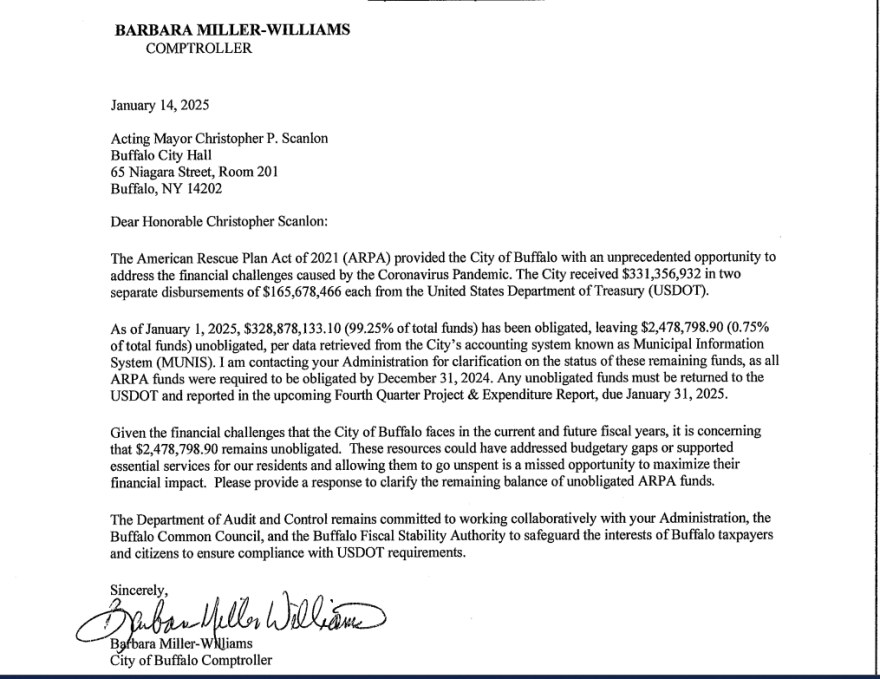The City of Buffalo has failed to obligate almost $2.5 million in federal American Rescue Plan (ARP) funds according to the city's comptroller, Barbara Miller-Williams.
The money had to be under contract by the end of 2024 to comply with federal rules.
In 2021, the city was awarded $331 million in federal ARP cash to support the recovery from the Covid-19 pandemic.
In a letter to Acting Mayor Chris Scanlon, Miller-Williams claims that as of Jan. 1, $2,478,798.90 of the city’s ARP funds remain unobligated according to the city’s accounting system.
Miller-Williams asks Scanlon’s administration to clarify the status of the remaining funds and points out that all ARP cash had to be under contract before the end of 2024, with any unobligated cash to be returned to the federal government.

The comptroller was forthright in her assessment of the city's cash-handling skills if the accounting data turns out to be accurate.
“Given the financial challenges that the City of Buffalo faces in the current and future fiscal years, it is concerning that $2,478,798.90 remains unobligated,” Miller-Williams said.
“These resources could have addressed budgetary gaps or supported essential services for our residents and allowing them to go unspent is a missed opportunity to maximize their financial impact,” she added.
But in a statement Scanlon "firmly rejects" Miller-Williams' claim and says her assertion "reflects a clear misinterpretation of the data." He maintains that the city has "fulfilled its obligations under ARPA guidelines."
Though he does not mention him by name, Scanlon turns on the former Commissioner of Administration & Finance Delano Dowell: "It is particularly concerning that the former Commissioner of Administration and Finance - now Deputy Comptroller - fails to understand the status of projects he helped oversee and were approved by the Common Council."
Dowell resigned as Commissioner of Administration & Finance in early December, and was made Deputy Comptroller instead, taking a significant leadership role in the Department of Audit & Control.
At the time Scanlon said he "accepted" Dowell's resignation and thanked him for his "dedicated service." So Scanlon's statement is a significant tonal shift from Scanlon on Dowell.

As comptroller, Miller-Williams shall "superintend the fiscal affairs of the city; keep, audit and state all accounts in which the city is interested and keep accurate and proper books showing their condition at all times," according to the city charter. She also leads the Department of Audit & Control.
That the city's lead auditor and executive branch appear to be at odds over its ARP accounts raises questions concerning the city's accounting processes.
In his Jan. 16 statement, Scanlon says that his administration performed a "detailed audit review" of the ARP funds.
However in a Dec. 23 council caucus meeting, Acting Administration & Finance Commissioner Raymour Nosworthy said it was "not an official audit," and that auditing firm Drescher Malecki LLC completed the work in-kind. In response to Councilmember David Rivera's request to see paperwork from the audit, Nosworthy emphasized that "zero documentation" was produced as a result of the process because it was "just a review."
In a Dec. 30 Common Council special session, Scanlon confirmed that Drescher Malecki LLC worked "side by side" with his administration to review the city's ARP allocations.
The confusion between the comptroller's office and Scanlon's administration is the latest development in a series of missteps from the city concerning ARP dollars.
Last month it was revealed that $11 million allocated for a water arrears forgiveness program was allegedly spent on water infrastructure instead, according to Scanlon – a finding that came about after he directed auditors to check the city's ARP allocations before the federal deadline.
That same month, the Common Council approved the city’s sixth and seventh ARP spending plan amendments which took a separate $17 million in ARP funds and rolled it into revenue replacement. That cash was either pulled from planned ARP funded community projects that could not be obligated in time, or was left over from other ARP initiatives.



